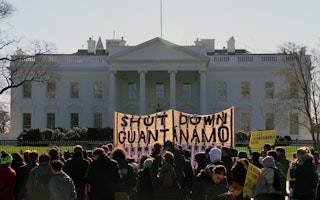Three Things You Didn’t Know Are in the CIA Torture Report
By Katherine Hawkins
A year ago last week, the Senate Select Committee on Intelligence voted to request declassification of the executive summary of its report on CIA torture. Many revelations have not received the attention and investigation they deserve. Here are three examples.
A congressional proposal to investigate detainee abuse triggered the CIA’s decision to destroy the torture videotapes.
According to the Senate report, the CIA feared that Congress would learn about the videotapes. Acting CIA general counsel John Rizzo wrote to other CIA lawyers on October 31, 2005, that former Michigan Democratic Senator Carl Levin’s proposal to create an outside commission to investigate charges of detainee abuse was gaining “some traction” in Washington. Rizzo added, “I think I need to be the skunk at the party again and see if the director is willing to let us try one more time to get the right people on board with our notion of our [sic] destroying the tapes.” Two other CIA lawyers shared Rizzo’s concern that a commission would uncover and review tapes “that should have been destroyed ... two years ago.”
A few days later, on November 4, CIA counterterrorism center lawyers Steven Hermes and Robert Eatinger reportedly told Jose Rodriguez, the head of the CIA’s clandestine service, that he had the legal authority to destroy them. On November 8, Rodriguez ordered the tapes destroyed.
Rizzo claimed in his memoir that he was “still not entirely certain what, other than the passage of time, prompted” the calls to destroy the tapes. But the Senate report shows that Rizzo himself suggested seeking authorization to destroy the tapes in response to a Congressional investigation. Rizzo also claimed that CIA lawyers never would have approved the tapes’ destruction before a thorough “scrub of the ongoing and pending court cases and congressional investigations … to ensure that destruction could not conceivably impact any of them.” But, in fact, CIA lawyers cited Senator Levin’s proposal for an independent commission as a reason to destroy the tapes.
CIA headquarters repeatedly instructed interrogators at “black sites” to keep torturing suspects even though CIA interrogators believed prisoners had been “broken.”
The Senate report documents how senior officials at the CIA repeatedly overruled the judgment of their case officers as to when detainees were “broken,” and ordered them to continue torturing suspects.
For example, after five or six days of waterboarding and using other “enhanced” techniques against Abu Zubaydah, the interrogation team in Thailand cabled CIA headquarters that they found it unlikely that Abu Zubaydah was still withholding “actionable new information about current threats.” The next day, the interrogation team warned that they believed Zubaydah’s interrogation was “approach[ing] the legal limit” of what the Justice Department had authorized.
Rodriguez, then chief of the CIA’s Counterterrorism Center, replied that “[s]uch language is not helpful” and should “be refrained from in written traffic.” Rodriguez and his colleagues at headquarters repeatedly instructed the team in Thailand to continue Abu Zubaydah’s torture, which went on for 10 more days. This included a waterboarding session in which Zubaydah inhaled so much water that he lost consciousness.
In December 2002, interrogators at a black site in Poland told CIA headquarters they believed Abd al-Rahim al-Nashiri was being “cooperative and truthful,” and was not “withholding important threat information.” Headquarters responded that “it is inconceivable to us that al-Nashiri cannot provide us concrete leads.”
Disregarding field interrogators’ warnings, they assigned an officer to Poland despite the fact that he had not been trained as an interrogator. This officer conducted mock executions with a pistol and cordless power drill, threatened to sexually abuse al-Nashiri’s mother, and put him in such excruciating stress positions that a medical officer thought his shoulders would be dislocated.
In three other instances, CIA managers directed field interrogators to resume interrogations of Ramzi bin al-Shibh, Janat Gul, and Abu Faraj al-Libi. The Senate report described this as part of a more general pattern in which CIA management “marginalized and ignored numerous internal critiques, criticisms, and objections” to the operation of the black-site program.
The CIA falsely told the Justice Department that Sen. John McCain supported techniques he called “torture.”
The Senate report proves that the CIA lied to the Department of Justice numerous times, including about Arizona Republican Senator John McCain’s view of what he considered torture. (McCain was held for more than five years as a prisoner of war in Vietnam and subjected to torture). On July 20, 2007, the Office of Legal Counsel (OLC) found that the six “enhanced interrogation techniques” the CIA was still using—including sleep deprivation by means of shackling diapered detainees in a standing position for days at a time—complied with the Geneva Conventions.
OLC lawyer Steven Bradbury cited CIA claims that “several Members of Congress, including the full memberships of the House and Senate Intelligence Committees and Senator McCain” were briefed on the six techniques, and “none of the Members expressed the view that the CIA interrogation program should be stopped, or that the techniques at issue were inappropriate.”
In fact, CIA records show that several senators objected to the program and that McCain specifically called sleep deprivation “torture” during at least one CIA briefing on September 11, 2006. In emails between two CIA officers, one officer wrote that the briefing was “painful” because the CIA did not persuade McCain that sleep deprivation was not torture.
The day after Bradbury’s OLC opinion was issued, the CIA began interrogating its last detainee, Muhammad Rahim. Rahim was kept awake, shackled in a diaper, for eight prolonged sessions of sleep deprivation, including sessions of 62, 100, 104 and 138.5 consecutive hours.
OpenTheGovernment.org is a grantee of the Open Society Foundations.
Read the executive summary of the Senate’s torture report [PDF].
Katherine Hawkins is the national security fellow at OpenTheGovernment.org.


